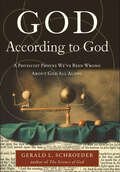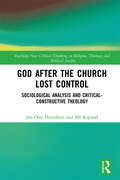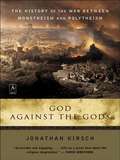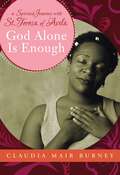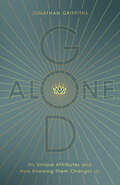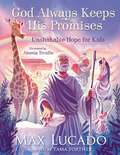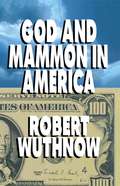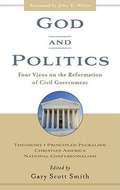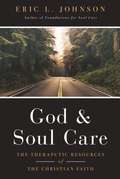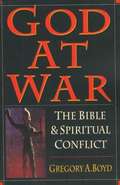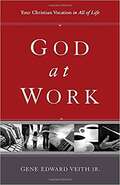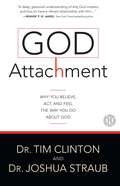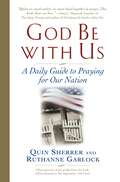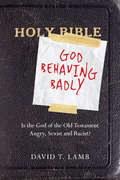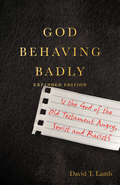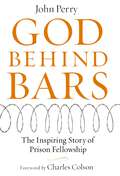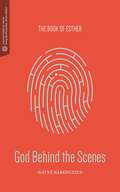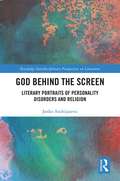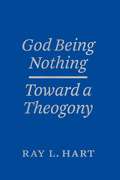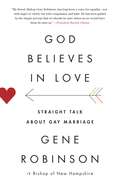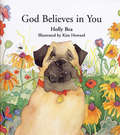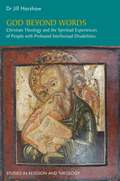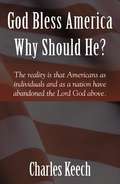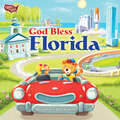- Table View
- List View
God According to God: A Physicist Proves We've Been Wrong About God All Along
by Gerald L. SchroederThis “brilliant” book by an M.I.T. trained physicist “demands the attention of anyone who wonders if God must be exiled from the modern, enlightened mind” (David J. Wolpe, author of Why Faith Matters).In his first book since 2002’s acclaimed The Hidden Face of God, popular scientist Gerald Schroeder combines decades of scientific research and biblical study to present a groundbreaking new theory of how to understand God. With riveting chapters on the origins of life, a scientist’s view of creation, and the unique place of our planet in the galaxy, God According to God offers a radical paradigm shift that will forever change how we comprehend God.“This is as important a book on this subject as I recall ever having read.” —Huston Smith, author of The World’s Religions
God After the Church Lost Control: Sociological Analysis and Critical-Constructive Theology (Routledge New Critical Thinking in Religion, Theology and Biblical Studies)
by Jan-Olav Henriksen Pal RepstadThis book combines insights from sociology of religion and theology to consider the fundamental changes that have taken place in how people think about God in contemporary Western society. It can be said that God has become irrelevant for many people, often as a result of well-grounded ethical critique of churches. Here the authors argue for the necessity of rethinking God-talk in a pluralist and changing context and for thinking critically about hegemonic ways of speaking about God from a moral and experiential perspective, not only from the point of view of abstract theology. Drawing on empirical material from a Norwegian setting, the book advocates a critical-constructive theology with a notion of God that takes human experience and social change seriously. It depicts a God who is an enabler of moral maturity rather than an authoritarian moral instructor, a God who is on the side of the marginalized and poor, and a challenge to unjust hierarchies.
God Against The Gods
by Jonathan KirschPerfectly suited to readers of Bernard Lewis and Karen Armstrong, God Against the Godsis a dramatic and eye-opening epic of the final struggle between monotheism and polytheism in the ancient world. It was a war fought by an Egyptian pharaoh, a Jewish king, and a Roman emperor-charismatic, visionary, and violent men battling in the name of the Only True God. Jonathan Kirsch demonstrates how the world of classical paganism was in fact based on religious liberty and diversity and how the advent of monotheism brought-in the name of true belief-holy war, crusades, martyrdom, and inquisitions. The last stand of paganism in the tumultuous fourth century is a rare example of a moment when two men-the Roman emperors Constantine, who initiated the Christian revolution that formed the future, and Julian, who later tried but failed to restore paganism-literally changed the history of the world. God Against the Gods, breaking a long-lived taboo, reveals monotheism's dark side and polytheism's bright one, illuminating the ancient roots of today's most bloody conflicts as well as the cherished idea of religious liberty.
God Against the Gods: The History of the War Between Monotheism and Polytheism
by Jonathan KirschThe old Egyptian and Roman gods and the new religion of the Hebrews and Christians have a history. Much of it occurs during the six hundred years or so of the Roman Empire.
God Alone Is Enough: A Spirited Journey with Teresa of Avila
by Claudia Mair BurneyNo one can teach a Christian to pray, like Teresa can.This lively little book introduces postmodern readers to one of Christianity's most endearing prayer warriors, and guides them through her most radical teachings. Here, Teresa of Avila is not a lofty, inaccessible saint; she's a companion, taking readers on a rollicking journey through their own interior castles. The secrets of Teresa's intimate devotional life are revealed, and readers learn practical ways to abandon complicated contemplative prayer techniques, and simply "enjoy" God. This journey through the life and writings of Teresa of Avila will engage Christians who would have never before considered encountering a post-Reformation Catholic nun. Mair Burney makes Teresa accessible—and essential—for understanding what it means to come to know God, and how it's possible.
God Alone: His Unique Attributes and How Knowing Them Changes Us
by Jonathan GriffithsOur constant danger is that we have a view of God that is too small.We are living in a me-focused, treat-yourself world—a world that oppressively encourages us to focus on ourselves. But a life turned inward—rather than focused on God—brings peril and confusion. When we fail to know God properly, we become selfish and hopeless. But a renewed understanding of who God is changes that.Pastor Jonathan Griffiths shows us how God Alone can transform us at a root level. With pastoral warmth and heart, Griffiths shows us the character of God in all His beauty and goodness. Readers will gain knowledge of God&’s attributes—that He is eternal, all-knowing, and all-wise. Readers discover what it means that God is omnipotent, unchanging, and omnipresent. And through this knowledge, trust, hope, and joy emerge. Confidence grows when we have a robust understanding of God&’s love.This book is both a plea for the people of God to know Him intimately and, at the same time, an invitation to those who do not yet know Him—come and experience the wonderful, beautiful, powerful God revealed in Scripture.
God Always Keeps His Promises: Unshakable Hope for Kids
by Max LucadoShare God&’s faithfulness and love with your child through Max Lucado&’s new children&’s book, God Always Keeps His Promises. Based on the promises of God, children will see that God is completely trustworthy to keep His promises. Just like He did in Bible times. Just like He does for them today.Since the beginning of time, God has kept His promises. Through the stories of Adam and Eve, Abraham, Joseph, Peter, Paul, and many more, children will learn about the character and nature of God and His unending love for His people. Offer children the chance to learn about the promises God made to His followers in the Bible, and the knowledge that they still get to experience these promises today. Each chapter features a promise from God accompanied by a story example from the Bible and an application for children today.Max Lucado, beloved pastor and bestselling author, is a revered authority on biblical teaching. Yet his gentle, loving approach makes it possible for even the youngest children to understand God&’s tenderness toward them.Through beautiful illustrations and compelling stories, Max will guide your family through God&’s unfailing goodness and faithfulness through the promises He made, and how He kept those promises in Bible times and how He still keeps them today.
God And Mammon In America
by Robert WuthnowDrawing on a new survey of more than two thousand working Americans, the author of Christianity in the 21st Century explores the relationship between religious faith and attitudes toward work and money to examine Americans' ambivalence toward materialism and consumerism.
God And Politics: Four Views On The Reformation Of Civil Government
by Gary S. Smith16 contributors represent four positions on the biblical role of civil government. Originally delivered at a consultation on that topic, each of the four major papers is presented by a leading representative of that view and is followed by responses from the three other perspectives.
God And Soul Care: The Therapeutic Resources Of The Christian Faith
by Eric L. JohnsonChristianity, at its heart, is a therapeutic faith—a religion of soul care. The story of Christianity is a story of divine therapy. God's therapeutic agenda begins in the perfect triune communion of Father, Son, and Holy Spirit. The triune God created human beings to flourish by participating in his glory, but human beings rebelled against this agenda and fell into the psychopathology of sin. God therapeutically intervened in Jesus Christ to bring about healing in body and soul. Through his incarnation, life, death, resurrection, and exaltation, Christ put to death the soul-disordering consequences of sin and brought about a new creation through union with and conformity to him. The church as the body of Christ is where God's therapy is put into action—where people can flourish in communion the way God originally intended. Told in this way, the deep connection between Christian faith and psychology becomes evident. While many Christians are wary of therapy, the Christian tradition is thoroughly therapeutic and contains ample resources for engaging in dialogue with modern psychology. In God and Soul Care—a companion to Foundations for Soul Care—Eric L. Johnson explores the riches of Christian theology, from the heights of the Trinity to the mysteries of eschatology. Each chapter not only serves as an overview of a key doctrine, but also highlights the therapeutic implications of this doctrine for Christian counseling and psychology. A groundbreaking achievement in the integration of theology and psychology, God and Soul Care is an indispensable resource for students, scholars, pastors, and clinicians.
God At War: The Bible and Spiritual Conflict
by Gregory A. BoydThrough a close and sophisticated reading of both Old and New Testaments, Boyd argues that Satan has been in an age-long (but not eternal) battle against God, and that this conflict "is a major dimension of the ultimate canvas against which everything within the biblical narrative, from creation to the eschaton, is to be painted and therefore understood."No less edifying than it is provocative, God at War will reward the careful attention of scholars, pastors, students and educated laypersons alike.
God At Work: Your Christian Vocation In All Of Life
by Gene Edward VeithWork can be a daily grind―a hard, monotonous set of thankless tasks. In the midst of the ongoing toil, many are plagued by a lack of purpose, confused as to what to do and who to become. And while some of our vocations may seem more overtly meaningful than others’, the truth is that most of us work because we have to. It is a means to an end―survival. Given the enormous amount of time each of us spends working, we would do well to understand our callings and how God works through them.
God Attachment: Why You Believe, Act, and Feel the Way You Do About God
by Tim Clinton Dr. Dr. Joshua StraubGod. Whether one loves him, hates him, denies or defies him, it is hard to deny the worldwide fascination with God. This book explores why and suggests a personal response to the God Attachment in all of us.Why has the human race, the world over, been so fascinated with . . . some might say obsessed with . . . God? This built-in attachment to God crosses religious, political, ethnic, cultural, and generational barriers.Drs. Clinton and Straub reveal fascinating research about this worldwide phenomenon. From avoidant, anxious, and fearful to secure and personal, the range of responses to our internal attachment to God has a profound influence on the way we do relationships, intimacy, and life choices.With helpful self-assessments, intriguing questions, and surprising revelations, this book moves from worldwide statistics to personal challenge, offering the means to become securely attached to God in a way that can have positive effects on our attitudes, approach to life, and overall life satisfaction.
God Be with Us: A Daily Guide to Praying for Our Nation
by Quin Sherrer Ruthanne GarlockIn this time of crisis, God Be With Us offers comfort with the one thing we all have in commonprayer. Daily meditations and relevant Scripture will help readers to pray for their families, communities, churches and armed forces. A portion of the profits will go to charities aiding victims of the terrorist attack.
God Behaving Badly: Is the God of the Old Testament Angry, Sexist and Racist?
by David T. LambGod has a bad reputation. Many think of God as wrathful and angry, smiting people right and left for no apparent reason. The Old Testament in particular seems at times to portray God as capricious and malevolent, wiping out armies and nations, punishing enemies with extreme prejudice. But wait. The story is more complicated than that. Alongside troubling passages of God's punishment and judgment are pictures of God's love, forgiveness, goodness and slowness to anger. How do we make sense of the seeming contradiction? Can God be trusted or not? David Lamb unpacks the complexity of the Old Testament to explore the character of God. He provides historical and cultural background to shed light on problematic passages and to bring underlying themes to the fore. Without minimizing the sometimes harsh realities of the biblical record, Lamb assembles an overall portrait that gives coherence to our understanding of God in both the Old and New Testaments.
God Behaving Badly: Is the God of the Old Testament Angry, Sexist and Racist?
by David T. LambGod has a bad reputation. Many think of God as wrathful and angry, smiting people right and left for no apparent reason. The Old Testament in particular seems at times to portray God as capricious and malevolent, wiping out armies and nations, punishing enemies with extreme prejudice. But wait. The story is more complicated than that. Alongside troubling passages of God's punishment and judgment are pictures of God's love, forgiveness, goodness, and slowness to anger. How do we make sense of the seeming contradiction? Can God be trusted or not? David Lamb unpacks the complexity of the Old Testament to explore the character of God. He provides historical and cultural background to shed light on problematic passages and bring underlying themes to the fore. Without minimizing the sometimes harsh realities of the biblical record, Lamb assembles an overall portrait that gives coherence to our understanding of God in both the Old and New Testaments. This expanded edition includes an updated preface, afterword, and appendix addressing the story of Noah and the flood.
God Behind Bars: The Amazing Story of Prison Fellowship
by John PerryWhen Charles Colson was released after seven months of prison time following the Watergate scandal, the last thing on earth he wanted to do was go back into those dark, frightening prisons, but God called him to do just that. Thus was born a life-long ministry, and here, for the first time, if the amazing success story of Prison Fellowship's thirty years of work in the darkest places on earth.
God Behind the Scenes: The Book of Esther (Transformative Word)
by Wayne K. BarkhuizenAlthough the book of Esther contains no direct references to God, his fingerprints can be found all over it. In God Behind the Scenes, Wayne K. Barkhuizen helps us trace the unseen hand of God throughout the Esther narrative, while pointing out how the book is still relevant today. As we walk through the book, we'll see how God was indeed active in preserving the people through whom the Messiah, Jesus Christ, would one day come.
God Behind the Screen: Literary Portraits of Personality Disorders and Religion (Routledge Interdisciplinary Perspectives on Literature)
by Janko AndrijasevicThis interdisciplinary study of literary characters sheds light on the relatively under-studied phenomenon of religious psychopathy. God Behind the Screen: Literary Portrais of Religious Psychopathy identifies and rigorously examines protagonists in works from a variety of genres, written by authors such as Aldous Huxley, Jane Austin, Sinclair Lewis, and Steven King, who are both fervently religous and suffer from a range of disorders underneath the umbrella of psychopathy.
God Being Nothing: Toward a Theogony (Religion and Postmodernism)
by Ray L. HartIn this long-awaited work, Ray L. Hart offers a radical speculative theology that profoundly challenges classical understandings of the divine. God Being Nothing contests the conclusions of numerous orthodoxies through a probing question: How can thinking of God reach closure when the subjects of creation are themselves unfinished, when God's self-revelation in history is ongoing, when the active manifestation of God is still occurring? Drawing on a lifetime of reading in philosophy and religious thought, Hart unfolds a vision of God perpetually in process: an unfinished God being self-created from nothingness. Breaking away from the traditional focus on divine persons, Hart reimagines the Trinity in terms of theogony, cosmogony, and anthropogony in order to reveal an ever-emerging Godhead who encompasses all of temporal creation and, within it, human existence. The book's ultimate implication is that Being and Nonbeing mutually participate in an ongoing process of divine coming-to-birth and dying that implicates all things, existent and nonexistent, temporal and eternal. God's continual generation from nothing manifests the full actualization of freedom: the freedom to create ex nihilo.
God Believes in Love: Straight Talk About Gay Marriage
by Gene RobinsonFrom the Bishop of the Diocese of New Hampshire in the Episcopal Church, the first openly gay person elected (in 2003) to the historic episcopate and the world's leading religious spokesperson for gay rights and gay marriage--a groundbreaking book that lovingly and persuasively makes the case for same-sex marriage using a commonsense, reasoned, religious argument, made by someone who holds the religious text of the Bible to be holy and sacred and the ensuing two millennia of church history to be relevant to the discussion, equally familiar with the secular and political debate going on in America today, and for whom same-sex marriage is a personal issue; Robinson was married to a woman for two decades and is a father of two children and has been married to a man for the last four years of a twenty-three-year relationship.
God Believes in You
by Holly BeaHolly Bea's beloved bullmastiff, Buddy, is having a bad day. Left alone to guard the house, he is taunted by the neighborhood cats, who know that he can't touch them. Buddy is worried--will Holly be back soon, or is she gone for the day, or even forever? Much to Buddy's relief, Holly returns. They go to the park, but Buddy's fun is cut short by a pack of hostile squirrels and a team of Dalmatian firedogs who challenge his self-esteem. Will this day ever end? Buddy's day is a metaphor for the doubts and anxieties children face, and a soothing reminder that God will always be there for them.
God Beyond Words: Christian Theology and the Spiritual Experiences of People with Profound Intellectual Disabilities
by Jill HarshawIn this groundbreaking book, Jill Harshaw explores the spiritual experiences of people with profound intellectual disabilities with regard to their capacity to enjoy life-giving spiritual experiences in their own right. The author expertly argues that our thinking of spiritual life needs to start not with our assumptions about people who are unable to speak for themselves, but with what we can know about God. Stimulating a much-needed discussion, this book explains why we need to respect individuals with profound intellectual disabilities as spiritual persons, and stop seeing them simply as care-receivers or uncomfortable reminders of human vulnerability. Calling for a more critical approach in practical theology, this book invites a deeper, genuinely inter-disciplinary dialogue between new and traditional theological fields, and asks why, after more than 30 years of intellectual disability theology, the impact on church life remains minimal so that debates around the right to basic inclusion continue to dominate. The questions raised in this book not only move the discussion forward, but will spark a change on how the Church approaches inclusiveness.
God Bless America: Why Should He?
by Charles KeechThe reality is that Americans as individuals and as a nation have abandoned the Lord God above.
God Bless Florida (A Land That I Love Book)
by ZondervanTake a tour of the most amazing landmarks and cities in Florida! God Bless Florida will show readers how special their state is and how God made such a wonderful place for us to live.
